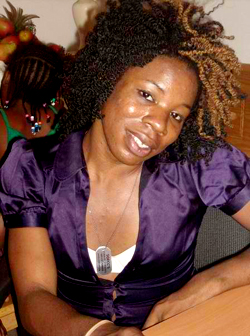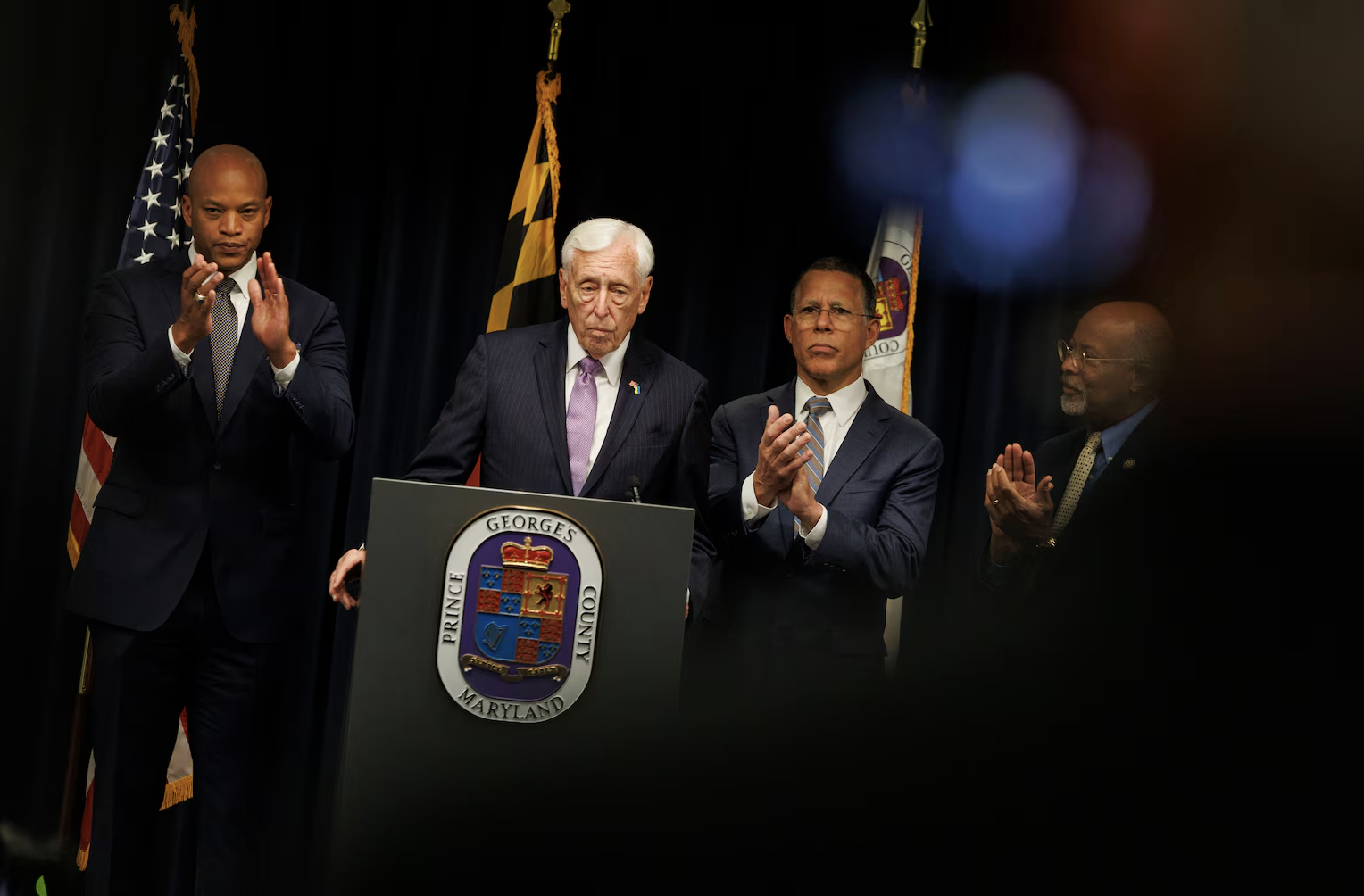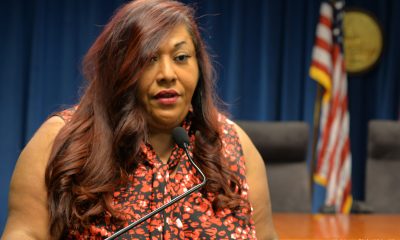Local
D.C. police struggle over disclosure of transgender murder
Trans woman shot to death in Northeast D.C.

D.C. police initially withheld information disclosing that the victim of a shooting death early Wednesday morning in Northeast Washington was a transgender woman, reopening concerns among LGBT activists about police handling of crimes affecting the transgender community.
In a press release issued Wednesday afternoon, police identified the victim as “23-year-old Myles Mclean of N.E. Washington, D.C.” The release made no mention that “Myles” is the legal birth name given to a transgender woman who had been using the name Lashai Mclean following her gender transition over the past several years.
The press release says Sixth District officers responded to a report of a shooting on the 6100 block of Dix Street, N.E. at 4:26 a.m. on July 20 and found the victim suffering from an apparent gunshot wound. The release says the victim was pronounced dead at a local hospital.
While the department’s Public Information Office omitted information about Mclean being a transgender person in its press release to the news media, the police Special Liaison Division, which oversees the Gay & Lesbian Liaison Unit, disclosed the transgender angle to the case in e-mails it sent to its list of various community activists and organizations, including LGBT activists.
A police spokesperson said late Thursday that investigators had not determined a motive or identified a suspect in the case.
Around the same time that police issued their press release, the office of Mayor Vincent Gray issued a separate press release that did identify Mclean as a transgender person.
“Metropolitan Police Department Chief Cathy Lanier today reported to Mayor Vincent Gray a homicide overnight at 6110 Dix Street, N.E. in which the victim of a fatal shooting was a transgender person,” says the release from the mayor’s office.
“Jeffrey D. Richardson, director of the Mayor’s Office of Gay, Lesbian, Bisexual and Transgender Affairs, also was advised of the incident,” the release says. “At this time MPD officials say they have no information to indicate that this is a hate crime. However, it is very early in the investigation.”
The release includes a statement from Gray saying every homicide in the city “is a tragedy for which the perpetrators must be brought to swift justice.” The mayor added, “However, if the investigation concludes that this shooting was the result of bias based on sexual orientation or gender identity, MPD and my administration will work with this community to see that there is an appropriate response to this kind of violence, which cannot be tolerated.”
Gwendolyn Crump, director of the police department’s Office of Communications, told the Blade on Friday that the department has a policy of not disclosing the gender identity or sexual orientation of crime victims unless police determine those characteristics are related to the crime.
“We respect the privacy of our victims,” Crump said.
Transgender activist Earline Budd, an official with the D.C. group Transgender Health Empowerment, said the police policy “makes no sense” in the Lashai Mclean murder case because Mclean lived openly as a transgender woman.
“There’s nothing private about this at all,” Budd said.
“We have requested that the police make a correction on that release,” said Ruby Corado, a member of the D.C. Trans Coalition. “We think the community should be notified about the true nature of this case.”
In the past, police officials have said they have decided on a case by case basis whether to disclose if a crime victim is transgender. In some cases, police officials have said they defer to the wishes of the victim’s parents or next of kin, some of whom have asked police not to reveal that a crime victim is transgender.
In a statement released on Thursday, the D.C. Trans Coalition said it learned from its own sources that “another trans woman was present during the attack and, thankfully, escaped.”
Transgender Health Empowerment, another organization that provides services to the transgender community, said Mclean had been one of the group’s clients and had frequently visited the group’s drop-in facility on North Capitol Street.
“Lashai was a friend to many people in the community – including several D.C. Trans Coalition organizers who offer our sincerest condolence to those grieving this loss,” the D.C. Trans Coalition statement says. “We must stress once again the absolute necessity for the police and media to respect Lashai’s gender identity. The least we can do to honor her memory is to respect her chosen, lived identity.”
The D.C. Trans Coalition and friends of Mclean are holding a candle light vigil in Mclean’s honor on Saturday, July 23, at 7 p.m., at the intersection of 61st and Dix Street, N.E., near where Mclean was murdered.
Virginia
Gay Va. State Sen. Ebbin resigns for role in Spanberger administration
Veteran lawmaker will step down in February

Alexandria Democrat Adam Ebbin, who has served as an openly gay member of the Virginia Legislature since 2004, announced on Jan. 7 that he is resigning from his seat in the State Senate to take a job in the administration of Gov.-Elect Abigail Spanberger.
Since 2012, Ebbin has been a member of the Virginia Senate for the 39th District representing parts of Alexandria, Arlington, and Fairfax counties. He served in the Virginia House of Delegates representing Alexandria from 2004 to 2012, becoming the state’s first out gay lawmaker.
His announcement says he submitted his resignation from his Senate position effective Feb. 18 to join the Spanberger administration as a senior adviser at the Virginia Cannabis Control Authority.
“I’m grateful to have the benefit of Senator Ebbin’s policy expertise continuing to serve the people of Virginia, and I look forward to working with him to prioritize public safety and public health,” Spanberger said in Ebbin’s announcement statement.
She was referring to the lead role Ebbin has played in the Virginia Legislature’s approval in 2020 of legislation decriminalizing marijuana and the subsequent approval in 2021of a bill legalizing recreational use and possession of marijuana for adults 21 years of age and older. But the Virginia Legislature has yet to pass legislation facilitating the retail sale of marijuana for recreational use and limits sales to purchases at licensed medical marijuana dispensaries.
“I share Governor-elect Spanberger’s goal that adults 21 and over who choose to use cannabis, and those who use it for medical treatment, have access to a well-tested, accurately labeled product, free from contamination,” Ebbin said in his statement. “2026 is the year we will move cannabis sales off the street corner and behind the age-verified counter,” he said.
Maryland
Steny Hoyer, the longest-serving House Democrat, to retire from Congress
Md. congressman served for years in party leadership

By ASSOCIATED PRESS and LISA MASCARO | Rep. Steny Hoyer of Maryland, the longest-serving Democrat in Congress and once a rival to become House speaker, will announce Thursday he is set to retire at the end of his term.
Hoyer, who served for years in party leadership and helped steer Democrats through some of their most significant legislative victories, is set to deliver a House floor speech about his decision, according to a person familiar with the situation and granted anonymity to discuss it.
“Tune in,” Hoyer said on social media. He confirmed his retirement plans in an interview with the Washington Post.
The rest of this article can be found on the Baltimore Banner’s website.
District of Columbia
Kennedy Center renaming triggers backlash
Artists who cancel shows threatened; calls for funding boycott grow

Efforts to rename the Kennedy Center to add President Trump’s name to the D.C. arts institution continue to spark backlash.
A new petition from Qommittee , a national network of drag artists and allies led by survivors of hate crimes, calls on Kennedy Center donors to suspend funding to the center until “artistic independence is restored, and to redirect support to banned or censored artists.”
“While Trump won’t back down, the donors who contribute nearly $100 million annually to the Kennedy Center can afford to take a stand,” the petition reads. “Money talks. When donors fund censorship, they don’t just harm one institution – they tell marginalized communities their stories don’t deserve to be told.”
The petition can be found here.
Meanwhile, a decision by several prominent musicians and jazz performers to cancel their shows at the recently renamed Trump-Kennedy Center in D.C. planned for Christmas Eve and New Year’s Eve has drawn the ire of the Center’s president, Richard Grenell.
Grenell, a gay supporter of President Donald Trump who served as U.S. ambassador to Germany during Trump’s first term as president, was named Kennedy Center president last year by its board of directors that had been appointed by Trump.
Last month the board voted to change the official name of the center from the John F. Kennedy Memorial Center For The Performing Arts to the Donald J. Trump And The John F. Kennedy Memorial Center For The Performing Arts. The revised name has been installed on the outside wall of the center’s building but is not official because any name change would require congressional action.
According to a report by the New York Times, Grenell informed jazz musician Chuck Redd, who cancelled a 2025 Christmas Eve concert that he has hosted at the Kennedy Center for nearly 20 years in response to the name change, that Grenell planned to arrange for the center to file a lawsuit against him for the cancellation.
“Your decision to withdraw at the last moment — explicitly in response to the Center’s recent renaming, which honors President Trump’s extraordinary efforts to save this national treasure — is classic intolerance and very costly to a non-profit arts institution,” the Times quoted Grenell as saying in a letter to Redd.
“This is your official notice that we will seek $1 million in damages from you for this political stunt,” the Times quoted Grenell’s letter as saying.
A spokesperson for the Trump-Kennedy Center did not immediately respond to an inquiry from the Washington Blade asking if the center still planned to file that lawsuit and whether it planned to file suits against some of the other musicians who recently cancelled their performances following the name change.
In a follow-up story published on Dec. 29, the New York Times reported that a prominent jazz ensemble and a New York dance company had canceled performances scheduled to take place on New Year’s Eve at the Kennedy Center.
The Times reported the jazz ensemble called The Cookers did not give a reason for the cancellation in a statement it released, but its drummer, Billy Hart, told the Times the center’s name change “evidently” played a role in the decision to cancel the performance.
Grenell released a statement on Dec. 29 calling these and other performers who cancelled their shows “far left political activists” who he said had been booked by the Kennedy Center’s previous leadership.
“Boycotting the arts to show you support the arts is a form of derangement syndrome,” the Times quoted him as saying in his statement.
-

 Colombia4 days ago
Colombia4 days agoGay Venezuelan man who fled to Colombia uncertain about homeland’s future
-

 Arts & Entertainment4 days ago
Arts & Entertainment4 days ago2026 Most Eligible LGBTQ Singles nominations
-

 District of Columbia4 days ago
District of Columbia4 days agoKennedy Center renaming triggers backlash
-

 District of Columbia4 days ago
District of Columbia4 days agoNew interim D.C. police chief played lead role in security for WorldPride


















